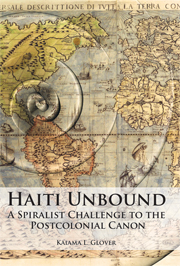Book contents
- Frontmatter
- Contents
- Acknowledgements
- Preface
- Part I Introduction: The Consequences of Ex-Centricity
- Part II Shifty/Shifting Characters
- Part III Space-Time of the Spiral
- 4 Haiti Unbound?
- 5 Present-ing the Past
- 6 Haiti in the Whirl/World
- Part IV Showing vs. Telling
- Part V Conclusions: No Lack of Language
- Works Cited
- Index
4 - Haiti Unbound?
from Part III - Space-Time of the Spiral
- Frontmatter
- Contents
- Acknowledgements
- Preface
- Part I Introduction: The Consequences of Ex-Centricity
- Part II Shifty/Shifting Characters
- Part III Space-Time of the Spiral
- 4 Haiti Unbound?
- 5 Present-ing the Past
- 6 Haiti in the Whirl/World
- Part IV Showing vs. Telling
- Part V Conclusions: No Lack of Language
- Works Cited
- Index
Summary
Mûr à crever and Les Possédés de la pleine lune
The spiral has precisely that power that enables it to inscribe in the text at once a decisive articulation of the history of a particular being and the non-history of a nation.
—Yves ChemlaSpatial practices in fact secretly structure the determining conditions of social life.
—Michel de CerteauAlthough, again, more straightforward in many ways than others of the Spiralist prose works, Frankétienne's Mûr à crever proposes striking destabilizations of time and space. The text functions primarily through the maintenance of certain tensions (between the public and the private; among the real, the remembered, and the imagined; among the insular, the regional, and the global; etc.), and so problematizes spatial boundaries and undermines chronological progression. On the one hand, Mûr à crever is very precisely situated in time and space: multiple references to the war in Vietnam suffice to establish the time of the present and set the tone for Frankétienne's critique of US imperialism; the city of Portau-Prince is named, and its geography presented in almost excessive detail. Yet while the prevalence of specific spatio-temporal markers establishes a realist frame for Mûr à crever, the narrative's presentoriented backdrop is consistently disrupted by the first person narrator's recounting of his childhood memories—seminal moments from a presumably distant past. The porousness of the boundaries separating the various narrative “positions” in Mûr à crever thus sets the stage for a corresponding spatio-temporal unpredictability and obliges the reader to engage with the narrative from various and at times seemingly unrelated points of view.
- Type
- Chapter
- Information
- Haiti UnboundA Spiralist Challenge to the Postcolonial Canon, pp. 106 - 127Publisher: Liverpool University PressPrint publication year: 2010



